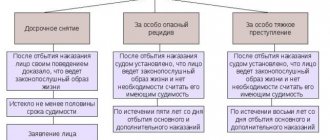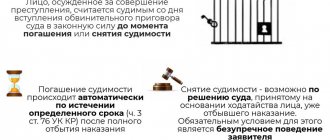Today, a huge number of people convicted under articles of the Criminal Code related to drug trafficking are serving their sentences in the colonies of the Federal Penitentiary Service of Russia. According to judicial statistics, almost a quarter of the entire prison population in Russia are convicted under “narcotic” charges. In absolute numbers, this is about 130-140 thousand people. At the same time, many prisoners under Art. 228 of the Criminal Code of the Russian Federation imposed very significant terms of imprisonment.
It is no secret that each of them dreams of being released before the end of his sentence, i.e. on parole.
How to get out on parole under Art. 228 of the Criminal Code of the Russian Federation? This is exactly what we will talk about in our next article on the “Condition” website.
Parole for 228 is possible
The right of a convicted person to apply for parole, according to Russian law, stems not from the crime committed, but from how successfully he is corrected. Therefore, YES, parole under Article 228 is POSSIBLE, as under any other article of the Criminal Code.
In order to be released from prison on parole, a person convicted under Article 228 of the Criminal Code of the Russian Federation must meet a certain set of criteria. In general, it differs slightly from the requirements for those convicted under other articles.
- at least three-quarters of the sentence has been served (this is a very significant part of the punishment - only terrorists and organizers of criminal communities must serve the same amount of time);
- a positive attitude towards study and work while serving a sentence;
- participation in the life of the detachment, improvement of the territory of the colony;
- good behavior in the colony;
- availability of incentives and absence of penalties;
- the attitude of the convicted person to his crime;
- compensation for damage caused by the crime;
- there is a positive characteristic from the institution where the person is serving his sentence.
Now let's look at each point in a little more detail:
How to submit a petition
Refusal to satisfy a request for parole on grounds that are not in the law, such as, for example, non-admission of guilt, short length of time served, social danger of the act, its consequences, etc., is illegal.
Consideration of the petition by the court
For example , a person is convicted of crimes under Art. 330 and 105 of the Criminal Code of the Russian Federation, for each of them a punishment was imposed. By partial addition of the imposed sentences, 15 years of imprisonment were finally determined to be served. This term, and not the one assigned for each crime, will be taken into account when calculating the mandatory portion of the term. The most serious act - according to Art. 105, classified as especially grave acts. Therefore, the rules for this category will apply, that is, to be released on parole you need to serve a minimum of 2/3 or 10 years.
When is it possible to apply for parole under Article 228 of the Criminal Code of the Russian Federation? The conditions that must be met to receive parole are regulated by Article 79 of the Criminal Code of the Russian Federation and apply to those convicted of drug trafficking. The general requirements for parole when serving a real prison sentence are as follows:
- When the right to parole becomes available, you must file a petition to the judicial institution at the place where the sentence is served;
- when considering the application, an opinion is requested from the management of the correctional institution on the advisability of release from serving the sentence;
- To consider the petition, the court is obliged to examine all the evidence presented - certificates of the convicted person’s behavior, documents on incentives and penalties while serving the sentence, etc.;
- If the petition is granted, the court releases the convicted person from serving the remaining part of the sentence while simultaneously establishing control over his behavior by the authorized government agency.
You may like => Monoblock service life
Parole under Article 228 part 2 in 2021
Russia provides for criminal liability for the storage, transportation and trafficking of narcotic drugs. Every year, thousands of Russians go to prison under the “anti-drug” Article 228 of the Criminal Code of the Russian Federation and receive sentences ranging from 2 to 15 years.
- not less than a third of the term that was assigned during the trial for acts that can be classified as minor and moderate gravity;
- if the citizen has already served half of the punishment for the committed act, which is classified as serious;
- if the citizen has already served two-thirds of the sentence for a crime of a particularly serious nature;
- if the citizen has served two-thirds of the sentence and was previously released on parole, but then it was revoked due to existing grounds;
- if the citizen has already served three-quarters of the sentence that was assigned to the citizen for committing an act against the sexual integrity of minor children, as well as for crimes that are of a grave and especially grave nature, related to the sale of drugs and substances that have psychotropic properties;
- no less than four-fifths of the term given to a citizen for an assault on the sexual integrity of persons under 14 years of age.
4. A citizen who is serving a life sentence can also receive parole, but only if the court considers it necessary and has good reasons for making such a decision. Such a convicted person can receive parole only if he has no serious penalties during the previous three years. If a citizen who is already serving a sentence for a criminal act that is of a grave or especially grave nature commits a crime again, then parole no longer applies to him.
Changes that affected those convicted of serious crimes
According to many people, if a citizen has committed a serious crime, then he does not have any leniency and therefore cannot be released early. But this does not depend on ordinary people, but on judges who consider each specific case separately, weigh the pros and cons and make a very important and responsible decision. Therefore, the new changes that affected the conditional and early release of a citizen from prison must be explained. Of course, not everyone can count on parole, because obtaining it requires certain grounds.
Acts provided for in parts one, two or three of this article, committed: a) by an organized group; b) by a person using his official position; c) by a person who has reached the age of eighteen, in relation to a minor; d) on a large scale, - Popraka 2021 Article 228 Part 2 The Council decided to consider bills in the first reading at meetings of the State Duma on Fridays in accordance with Part 7 of Article 118 of the Rules of Procedure of the State Duma at a fixed time (17 hours 30 minutes).
- criminal fine – up to 40 thousand rubles. or in the amount of the income of the guilty person for a period of up to three months (this type of punishment is provided for in Part 1 of Article 228 of the Criminal Code of the Russian Federation, and is applied only when the amount of drugs transported is significant);
- compulsory work;
- correctional work;
- restriction of freedom;
- imprisonment.
Article 228 part 2 of the Criminal Code of the Russian Federation - latest amendments and sentences
c) at least two-thirds of the term of punishment imposed for a particularly serious crime, as well as two-thirds of the term of punishment assigned to a person previously released on parole, if parole was canceled on the grounds provided for in part seven of this article;
Such measures are also applied as a matter of priority to cancer patients, pregnant women and disabled people, citizens who are raising children under 18 years of age or in need of support and care, and participants of the Second World War. How many will be released in 2021? According to the results of the statistical report, in 2021 there are about 800 thousand people in state custody in prisons.
Serving three quarters of the sentence
Three quarters of the term is a very significant part. If an offender is sentenced to imprisonment for eight years, he must serve as many as six of them before becoming eligible to apply for parole. For comparison, those convicted of a fatal accident receive this right after spending only a third of their sentence in prison. At the same time, as is known, those convicted of drug offenses are not entitled to recalculate the time spent in a pre-trial detention center during the investigation.
I am convinced that for drug offenders this requirement should be significantly relaxed - especially for those convicted for the first time. My opinion is connected with the fact that practically no correctional influence capable of curing a drug addict of addiction is provided in the colonies. A person is simply deprived of the opportunity to use drugs for a long time. And that’s not always the case—it’s often even easier to get dope in a colony than in the wild.
However, the law is the law. Three quarters will have to be rewinded. At the same time, the very fact of serving such a significant part of the sentence does not in any way guarantee that the person will be released on parole. He only receives the right to apply to the court with a corresponding petition. It is worth noting that during such a significant part of the sentence, the convict can manage to both do a lot for his parole, and also mess up quite a bit, putting early release into question.
How soon can I apply for parole 4 159 2021
The decision from June 12 de facto put ordinary fraudsters on an equal footing with those who cheated “in the sphere of entrepreneurial activity” and received a softer “entrepreneurial” article. According to Art. 159 of the Criminal Code of the Russian Federation, the amount of damage that is considered large and especially large is less than under Art.
159.4. At the same time, the possible terms of imprisonment in the “general” article for fraud are higher than in the “entrepreneurial” article: up to ten years in prison instead of five years. Considering that according to Federal Law No. 325 of July 3, 2021, Article 159.4 of the UKRF
Positive attitude towards study and work
The court takes into account how the convicted person related to study and work. It is a mistake to believe that if a convicted person did not work or study in a colony, he will not be released. Everything will depend on what reasons he had for not studying and not working. A certificate stating that a person has not left the prison library is a sufficient argument to consider his attitude towards studies to be positive. Just like an application asking for a job confirms your attitude towards work.
The law does not directly require a person to study in prison or work. In addition, many institutions are unable to provide prisoners with either work or educational opportunities. However, if a person both studied and worked, all this will be to his advantage and must be taken into account by the court when making a decision on parole.
You need to make a written request for employment as early as possible - it is optimal to do this while still in the pre-trial detention center. Most likely, in response you will receive a letter stating that there is no way to provide the person under investigation with work. This letter must be kept and presented to the court when applying for parole. You should make the same application upon arrival at the colony.
If the convicted person did not work for a good reason, this cannot be a basis for denial of parole. It’s another matter if he deliberately boycotts work. In this case, the colony may even write in the characteristics that the convict supports criminal traditions. This characteristic, as a rule, puts an end to the prospects for parole. Although, in this case there are exceptions.
Tag: st
Latest amendments to the weight of psychotropic drugs pvp The latest amendments to the list of narcotic and psychotropic substances were made by Decree of the Government of the Russian Federation dated 04/01/2020 N 256 “On amendments to certain acts of the Government of the Russian Federation in connection with improving control over the circulation of narcotic drugs...
What happens if you are caught with drugs? Will they be able to imprison you? What do you think? Most likely they will go to jail - after all, possession of narcotic drugs is already a crime, and distribution even more so. Of course, sometimes it is possible to prove that these drugs do not belong to the person on whom they were found...
Participation in the life of the detachment and improvement of the territory of the colony
Article 106 of the Criminal Executive Code allows the colony administration to involve convicts in “carrying out work to improve correctional institutions and adjacent territories.”
The duration of compulsory work should not exceed two hours per week. The convicted person can contact the administration with a statement that he wants to devote more time to the improvement of the MLS. This desire is reflected in the personal file of the convicted person and his characteristics when considering the issue of parole. Courts consider working above the norm to be another confirmation of the convict’s positive attitude towards work.
Participation in the life of the squad is an extremely vague formulation, but important. One of the tasks of correction is to ensure the return of the criminal to society, his socialization. Relationships in the team and active participation in the life of the squad are signs of successful socialization.
Contrary to the stereotype widespread among convicts, participation in the life of the detachment does not imply support for the SDP and other “sections” - a convict can actively play chess with colleagues, train them in the gym, promote reading among other convicts, or, for example, advise on legal issues.
Good behavior in a colony - the presence of rewards and the absence of penalties
When refusing parole, courts often indicate in their rulings that “the behavior of the convicted person during the period of serving his sentence was not ideal.” In fact, such wording is not legal, and if there are no other grounds for refusal, it can even serve as a reason to cancel the court’s decision.
Yes, the convicted person is obliged to comply with the Internal Regulations, i.e. "behave well." But he was brought to the colony for correction, and when deciding on parole, the judge must, first of all, take into account the dynamics of this very correction.
In the practice of ZNBM.ru, there are many cases when convicts who had reprimands and penalties (and not even one, but several) were released on parole. The law requires the court to “take into account data on rewards and penalties.” At the same time, the presence of incentives is not a sufficient reason for parole, and the presence of penalties is not a sufficient reason for refusal.
The court must evaluate each violation of the order. It is extremely important whether the penalty is related to the crime. If a person is convicted under 228, and received a penalty for catching the eye of his boss wearing an improperly buttoned jacket, there remains a high probability of parole.
The situation is much more dangerous when a person is serving a sentence for drugs and all his penalties are also related to drug use. In this case, the court will most likely draw conclusions that further correction is possible only in a colony. The court will most likely refuse parole.
It is also important how much time has passed since the collection was received. If a person, for example, violated the temporary temporary residence permit while still in pre-trial detention, and then repented of it and behaved exclusively positively in the colony, old tricks cannot be recognized as legal grounds for refusal of parole. Here, those convicted under 228 have a better chance of being granted parole than those who have the right to apply after a third of an already short term - careless criminals often simply do not have time to make amends for their mistakes, remaining for another six months (until the next right to apply petitions).
Administrator
Data from the report of the Judicial Department at the Supreme Court of the Russian Federation, form No. 10.3.01, indicate that in 2014, when considering 17,759 criminal cases of crimes under Part 2 of Art. 228 of the Criminal Code of Russia, the courts imposed punishment in the form of imprisonment for a term of 5 to 8 years in 261 cases, from 8 to 10 years - in 17 cases, and in 2457 cases the courts imposed punishment using an exceptional mechanism for imposing a sentence below the lower limit of the established sanctions.
Administrator
The latest amendments made to the legislation (government decree) clearly distinguished between drugs. Previously, these numbers were slightly lower. There is a detailed table where the weight (grams) for each type of drug is determined. How many years they can give (the length of the term) will directly depend on this.
Drugs, probation - this is the most common question that is asked to a lawyer, it all depends on the circumstances of the incident, on the materials that characterize the defendant, whether he works, whether he works or not, whether he has chronic diseases, what specific diseases the defendant has (you will agree that gastritis and severe asthma, this is a significant difference). And of course, the more severe the disease, which is confirmed by medical documents, the greater the chances of remaining free. Another important factor is the presence of minor children. This is a standard list of mitigating circumstances.
If the accused cooperates with the investigation and his actions contribute to the timely disclosure of the crime he committed or the suppression of the commission of other crimes, it should be assumed that the culprit has embarked on the path of correction and he poses less of a danger to society.
Legal advice on criminal law - Article 228 part 2 - suspended sentence no previous convictions
The presence of permanent or temporary registration at the place where the crime was committed is one of the decisive factors when a court assigns a suspended sentence; in the absence of such registration, courts very rarely apply a suspended sentence.
If crimes under Part 2 of Article 228 of the Criminal Code of the Russian Federation, Parts 1, 2 and 3 of Article 228.1 of the Criminal Code of the Russian Federation were committed before March 2, 2012, then parole under Part 2 of Article 228 and Part 1 of Article 228.1 of the Criminal Code of the Russian Federation is possible after serving ½ term of punishment. Under parts 2 and 3 of Article 228.1 of the Criminal Code of the Russian Federation after serving 2/3 of the sentence.
The attitude of the convicted person to the crime
Many (even very good lawyers) often write that for parole the convicted person must admit guilt. In fact, Article 79 of the Criminal Code of the Russian Federation requires the court to take into account only a person’s attitude towards the crime committed.
In Russia there really is a kind of “presumption of admission of guilt.” It is believed that this recognition is almost the main sign of correction. In fact, there are many reasons why a convicted person does not admit guilt. First of all, these are flagrant violations at the stage of investigation and consideration of the case on its merits.
A refusal to grant parole solely on the grounds that the convicted person has not admitted his guilt in a crime cannot be considered legal. The court must decide whether the person considers what he was convicted of to be a crime, whether he intends to continue to engage in criminal activity after his release, etc.
Admission of guilt is one of the most delicate points in the practice of parole. If the convicted person denies his guilt, the preparation of the petition must be taken much more carefully. In the case of Article 228, this is especially important, because it is under this article that the largest number of innocent people are serving sentences.
Compensation for damage caused by crime
As a rule, the “victims” in drug cases are the state and society, whose harm is intangible (not like, for example, in a road accident). Accordingly, there is no need to talk about compensation for this damage either.
However, courts traditionally like it when the convicted person atones for his guilt with money. Those serving sentences under Article 228 can only be advised to try to voluntarily spend some money to make amends for the harm. For example, courts like donations to thematic funds.
In addition, it is always beneficial to spend money on your own treatment. It is quite difficult to do this in a colony, but options exist. I will try to write a separate article about this aspect.
If there are real victims in the case, it is necessary to bring them a written apology and try to make amends for the harm.
Positive characterization and “colony support”
The heads of colony detachments like to promise convicts so-called “colony support” when considering the issue of parole. With this support they motivate, and often also blackmail. Is this so important and is it possible to get out on parole without the support of the administration?
By law, the court is obliged to take into account the opinion of the colony administration on the advisability of releasing the convicted person on parole. The colony must provide the court with a reference in which it indicates the circumstances of the person serving his sentence - how he treated his studies and work, whether he behaved well, whether he participated in the life of the detachment, whether he was polite to other convicts and representatives of the administration, and so on.
A positive characterization and “support for the colony” are indeed significant circumstances when resolving the issue of parole. However, the court is only obliged to take into account these circumstances - to refuse on the sole basis that the institution is against it, the court does not have the right.
According to statistics, in Russia just over 5% of the requests of convicts whose parole was opposed by the colonies are granted. In our own practice, the percentage of successful applications is even higher. Unfortunately, colonies do not do much to actually reform convicts, but they often want to keep a valuable employee. It is quite difficult to argue with the colony and the prosecutor in court, but it is possible. Both prosecutors and judges often take the side of the convicted person.
About the author administrator
By the way, very beneficial changes came out on December 27. 2021 in the Criminal Code of the Russian Federation, which also affect cases from category “228” (on drugs) when replacing the unserved part of the punishment with “Forced labor”. Let’s say that if for a serious crime (for example, Article 228 Part 2, Article 228.1 Part 1), when replacing it with a more lenient one, you must serve at least half of the sentence, but when replacing it with “forced labor,” you just need to serve at least 1/3 of the sentence; for a particularly serious crime (for example, Article 228 Part 3, Article 228.1 Part 2, 3, 4, 5) - at least half of the sentence, and if, when replaced with any other non-forced labor, then only after serving 2 /3 terms. The difference is of course significant. The only downside is that you will have to serve in special institutions.
You may like => Benefits for disabled people of group 3 in the Krasnodar region 2021
4 comments on “Exemption under ITR”
Hello, first of all, you need to get a certificate from a doctor stating that you are pregnant and are eligible for light work. Go with the certificate to the Criminal Executive Inspectorate. There they should transfer you to light labor, or replace the punishment, or defer it, but the second and third are already through the court.
Each case of illegal storage, use, sale and transportation of narcotic and psychotropic substances is considered by the court individually. The social behavior of the accused, his willingness to help the investigation, and the circumstances under which the criminal act was committed are taken into account. When examining each specific case, the courts are guided by Articles 61, 62 and 64 of the Criminal Code of the Russian Federation, which determine the presence of mitigating circumstances that make it possible to obtain a maximum reduction in the sentence - sometimes even below the minimum level. An experienced Article 228 lawyer will definitely take advantage of the opportunity.
Part four stipulates crimes committed on a large scale (imprisonment with payment of a large fine). It also determines punishment for actions that were committed by a group of people or by one person who used his official advantage.
Terms of punishment under Article 228 of the Criminal Code of the Russian Federation
3 tbsp. 310 of the Civil Code of the Russian Federation). This opportunity appeared on June 1, but only for obligations that are related to its management. Article 228 of the Criminal Code of the Russian Federation can be applied from the age of 16, and if narcotic substances were obtained through theft, extortion or robbery, criminal liability begins at the age of 14.
The administration of the institution must be notified about filing a petition, since in order to be considered on its merits, it is necessary to include a description of the convicted person in the materials. It must reflect information to be assessed by the court and a conclusion on the advisability of parole.







